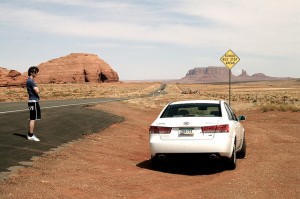New Mandala Research/Solutionz study shows determining own schedule and stopping whenever, wherever desired are primary reasons Americans, particularly boomers, opt to drive
Assistant Editor's Note: While not necessarily “adventure” oriented, this release points to the travel-freedom psyche of the U.S. consumer - particularly the Boomer generation that comprises the bulk of our members' clientele- and may be of particular interest to marketers.
[caption id="attachment_8224" align="pull-right" width="300" caption="Image by Angus MacRae under Creative Commons license."] [/caption]
[/caption]
Alexandria, VA. - Gas prices continue to hover around the $4-per-gallon mark, but most Americans still prefer the flexibility of a drive trip.
New data from a Mandala Research/Solutionz study of American travelers suggests itinerary control is the primary reason why almost three-quarters (74 percent) opt to drive their own vehicle to their destination, compared to the 17 percent who choose air travel.
“With the continued accumulation of ancillary airline fees, tighter seat configurations, baggage restrictions and airport security delays, it’s not surprising that Americans are asserting more control over their travel plans by opting to drive themselves,” says Chicke Fitzgerald, CEO of Solutionz, a travel industry strategic consulting firm based in Tampa, Fla.
That's one of the big conclusions drawn from the survey conducted among 1,500 drive market travelers in the United States in January.
The control factor is particularly important to travelers over 50. Eighty-one percent of those 50-plus say they like that they can determine their own schedules and stop where they like, while 71 percent say they like that they can “bring more stuff” when they drive to their destination.
The study also shows that among drive market travelers, nearly four in 10 Americans (38 percent) plan trips within a week of departure and 49 percent plan within two weeks or less.
“We’ve definitely become a society of last-minute planners, and although it creates considerable heartburn for travel suppliers, the continued trend to book last minute results in some great deals and serious discounting which travelers love,” says Laura Mandala, managing director of Mandala Research, a travel research firm based in Alexandria, Va.
According to the research, the availability of loyalty program rewards and discounts significantly influences the hotel decision of 70 percent of drive market travelers, and two-thirds suggest they can be lured by a lodging discount of 20 percent or more.
And where do auto travelers vacation? Consistent with all leisure travelers, California and Florida are visited by the greatest number of travelers surveyed, with 12 percent of the population having visited each of these states on their most recent trip. New York also ranks high (8%), followed by Texas, Pennsylvania, North Carolina and Virginia (6% each). The South ranked highest among regions visited with 64 percent, outdistancing the west (40%).
And while no city attracted more than 5 percent of these travelers, Orlando was the most visited at 5 percent, followed by Los Angeles, Las Vegas and New York City each with 4 percent of travelers visiting on their most recent trip.
The study is part of a larger effort known as Project 85, a think tank of U.S. travel and tourism organizations that are collaborating on marketing approaches and solutions for the U.S. travelers who drive rather than fly to their destinations.
According to the U.S. Travel Association, more than 1 billion overnight trips are taken annually with 85 percent of by car, RV, rental car, truck or motorcycle.
Following the release of the study, a group of industry leaders, including sponsors of the syndicated study, met together at the inaugural Think Tank in Las Vegas to discuss the conclusions drawn from the survey.
Participants in the Think Tank included AARP Services, Acxiom, MapQuest, Avis/Budget Group, CALARVC.com, Delaware North, Encore RV Resorts & Campgrounds, Experian/Hitwise, Keane Consulting, Leisure Interactive, Mandala Research, Panasonic, PlumLife.com, Shop America Tours, Smart Destinations, Tickets.com, Travel Guard, US Travel Association, Vantage Strategy, WCities, and Wyndham Worldwide.
“The drive market is extremely important to Wyndham Hotel Group, given the breadth of distribution of our 14 brands across the highways and byways in the US. With more than 6000 properties, many located on interstates and in key tourism markets, we believe there is a great opportunity to better target and serve this market, and the Project 85 Think Tank is a great way for us to share ideas and develop key initiatives in this area,” says Flo Lugli, executive vice president of marketing for the Wyndham Hotel Group.
“Project 85 really defined and underscored MapQuest’s user base and the specific needs our customers have,” said Christian Dwyer, senior vice president and general manager, MapQuest. “We want to help people get where they need to go, and the study helped us better understand when folks need inspiration, when they need information, and when they need help getting from one experience to the next.”
The Project 85 – The Drive Market study (US$500) is now available and provides comprehensive information for addressing these travellers’ needs.
